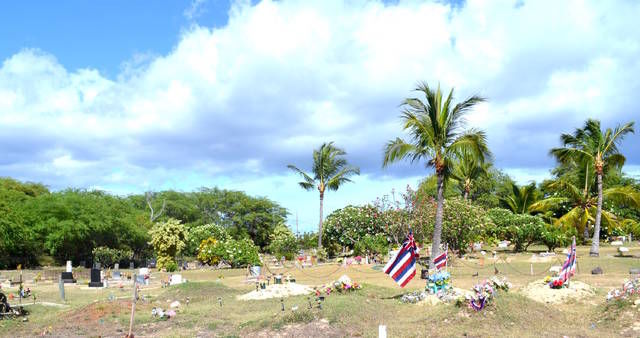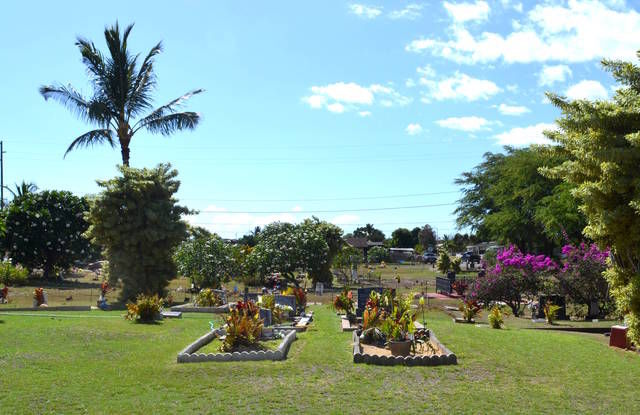KEKAHA — Cemetery space in Kekaha is a concern for Harold Vidinha. At a recent burial in May, the president of the Kekaha Hawaiian Homestead Association said space was so limited at the Kekaha Hawaiian Cemetery that the departed member’s
KEKAHA — Cemetery space in Kekaha is a concern for Harold Vidinha.
At a recent burial in May, the president of the Kekaha Hawaiian Homestead Association said space was so limited at the Kekaha Hawaiian Cemetery that the departed member’s family needed to place the grave’s soil on the road to make space for mourners.
“The problem is because it was uncontrolled in the past, from what I see, people blocked (plots) off for their families,” Vidinha said. “If worse comes to worse, whoever’s in charge of that cemetery will have to tell those people, ‘You gotta drop that chain or whatever you have, so we can properly put people there.’”
DOPR is responsible for 17 cemeteries, including the ethnicity-based cemeteries, public cemeteries and the Kauai Veterans Cemetery, according to Lenny Rapozo, director of the Department of Parks and Recreation. The veterans’ cemetery is staffed and budgeted for, while the remaining nine are taken care of by individuals, and plot designations are handled by the DOPR.
The Hawaiian Cemetery in Kekaha is one of seven managed by community volunteers.
“Kauai’s ethnicity-based cemeteries were established in different parts of the island during the sugar plantation era,” Rapozo said. “Each cemetery was designated for Hawaiians, Filipinos, Chinese or Japanese. The plantation owners and the families whose loved ones were buried in these cemeteries tended to the gravesites.”
With the demise of the plantations, the responsibility of the cemeteries was assumed by the county, but no resources were provided for their upkeep, Rapozo said.
“Over the years, the county has relied on the community, churches and individual organizations to help with the maintenance of these cemeteries,” he said. “With limited resources and the generosity of community groups, the system has worked up to this point.”
In Vidinha’s eyes, no one is in charge of the Hawaiian Cemetery in Kekaha.
“People go over there, digging graves, where they can find a spot and put their family in. It shouldn’t be that way,” he said. “You gotta take care of that dead — something respectable.”
Rapozo said the department manages the ground maintenance of the Kekaha cemetery: parks staff trims the trees and shrubbery and disposes of the trash.
With limited resources for upkeep, the DOPR relies on the community for assistance with managing other areas of the cemetery, he said.
Vidinha went on record at an Office of Hawaiian Affairs meeting in Kekaha in May, asking for additional land to bury the dead.
“I want to come back to OHA and see if OHA will participate in purchasing the land when we find an area, so we can put our dead in. They don’t have a place,” he said in the meeting.
OHA asked Vidinha to create a subcommittee and identify a parcel, then report the findings back the the board.
“If it’s state owned and operated, there might be an opportunity where that could get transferred to us or to Hawaiian Homes,” said OHA Chair Colette Machado. “Only you know your community and where you would like your cemetery. We can help you once you’ve established where you feel the land is appropriate.”
Vidinha also reached out to William Aila, deputy director for the Department of Hawaiian Homelands.
Burying the dead “is important for a social aspect, but our primary mission is to find lands for agricultural, pastoral homestead lots,” Aila said.
The DHHL, however, is looking at its inventory for potential lands that could be available for a cemetery, Aila said.
There is a caveat, though.
“Cemeteries for homesteaders are good if we can make it happen and somebody else manages it,” Aila said.
Vidinha would have it no other way.
“We can’t have a cemetery and do it like this, where everybody plot out their land,” Vidinha said. “I wouldn’t let that happen if I had anything to say because you’re disregarding other people. We’re here for everyone, so make it an organized cemetery.”
Land in Kokee and Hanapepe are potential cemetery locations, according to the DHHL.
“If there are lands that cannot be homesteaded, then these lands would become available for those purposes, such as a cemetery,” Aila said.
The search is in the preliminary stages, Aila added.
For more information on the Hawaiian Cemetery committee, call (808) 639-1218.



